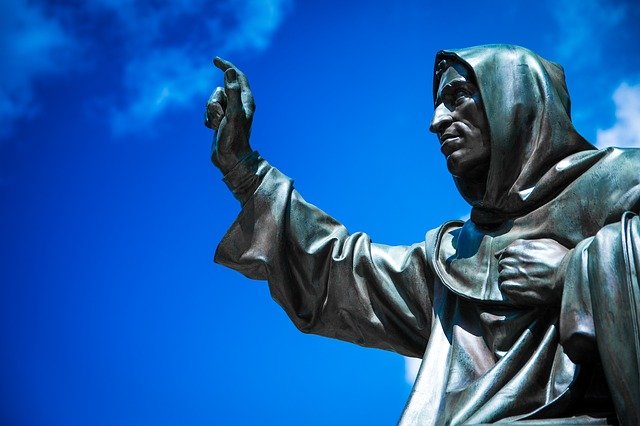By Tim Lambert
His Early Life
Martin Luther was a religious reformer who lived in the 16th century. Luther was born on 10 November 1483 in the German town of Eisleben. (In those days Germany was not a single country but was a federation of states called the Holy Roman Empire). His father was Hans Luther, a copper smelter. His mother was called Magretta. Hans Luther wanted his son to become a lawyer. Martin went to the University of Erfurt in 1501 and he received an MA in 1505.
The same year he was caught in a thunderstorm. Luther was shaken by the experience and he decided to become a monk, despite his father’s wishes. Martin Luther became an Augustinian monk in Erfurt. He was ordained a priest in 1507 and in 1512 he became a doctor of theology.
Meanwhile, in 1510 Luther went on a trip to Rome. He was shocked by the lack of piety he found there. Luther also had a strong sense of his sinfulness. He studied the Bible diligently and he came to disagree with some of the teachings of the Catholic Church. Luther believed that salvation was obtained by faith only. It cannot be earned by good works.
Then in October 1517, Martin Luther wrote 95 theses. He objected to the sale of indulgences (documents written by the Church releasing individuals from punishment for their sins. Indulgences could be bought by the living on behalf of the dead who were believed to be in purgatory). Copies of the 95 theses by Luther were distributed across Germany and then across Europe.
In 1519 and 1520 Martin Luther wrote several works, The Address To the Christian Nobility of the German Nation, On the Freedom of a Christian, and On the Babylonian Captivity of the Church. He denied there were seven sacraments as taught by the Catholic Church. Luther said there were only two, baptism and the Lord’s supper. Luther also believed in the priesthood of all believers. Martin Luther was excommunicated from the Catholic Church in January 1521. But Luther was undaunted.
Then in April 1521, he was called to appear before a secular assembly called the Diet of Worms. Luther refused to change his views saying: ‘Unless I am convicted by scripture and reason – I do not accept the authority of popes and councils, for they have contradicted each other – my conscience is captive to the Word of God’.
In May 1521 the Diet declared Luther an outlaw and a heretic and banned his writings. However, Martin Luther was protected by powerful friends and he hid in Wartburg Castle where he continued to write.
His Later Life
In 1522 Luther returned to Wittenberg In 1524 the German peasants rose in revolt. Luther condemned the rebellion and it was crushed in 1525. Also in 1525, Martin Luther married Katharina von Bora. The couple had 6 children. The same year, in 1525 Luther published his great work, The Bondage of the Will. Afterward, Luther continued to write. He translated the Bible into German (it was published in 1534). Luther also wrote hymns.
In his later years, Luther became anti-Semitic. At first, he hoped the Jews would be converted to Christianity by his preaching. When that did not happen he turned against them. In 1543 Luther published a book called On The Jews And Their Lies. Luther said that Jews were a ‘base, whoring people, that is, no people of God’. Luther advocated burning synagogues and schools. He also said that Jewish teachers should be banned and Jewish prayer books and Talmudic writings should be confiscated.

In the latter part of his life, Martin Luther suffered from chronic illness. He died on 18 February 1546 aged 62.